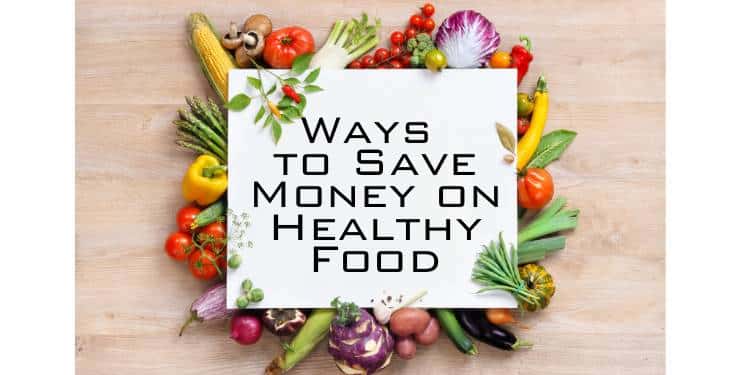How can I save money on healthy food when grocery prices are so crazy high these days, especially for organic items? It’s a big problem for many well-intentioned people.
I want to eat nutritious foods, but lately, I get upset every time I walk into a supermarket. Everything is more expensive than it used to be, and it feels like the cost at the register is extra high when I try to purchase mostly healthy options. The elevated costs started in 2020 when COVID decimated supply chains, driving up prices in almost all categories. Then came the rampant inflation which played a role in increasing costs too. Climate events and unpredictable diseases also contributed, and the conflict in Ukraine drove up the price of grains to near-record levels. Many think good old-fashioned greed is part of the equation as well. When will it stop?

Can You Save Money on Healthy Food?
Good question! The answer is yes. While all groceries are expensive these days, we can still prioritize healthy options at the supermarket. The perception is that healthy food is more expensive than unhealthy food. But it’s not necessarily true, and there are high costs associated with a poor diet. Think about these factors:
Initial Cost vs. Long-Term Savings
While some healthy foods like fresh fruits, vegetables, and lean proteins may seem more expensive upfront, they can provide long-term health benefits that may reduce medical expenses in the future. Investing in a balanced diet can be seen as a preventative measure against costly health issues.
Meal Planning
Effective meal planning can help you make the most of your grocery budget. When you plan your meals and make a shopping list, you’re less likely to buy unnecessary items, which can save money. I used to just sort of grab things as I walked up and down the aisle and much of what I purchased ended up unused. What a waste.
Eating Out
Eating out at restaurants that offer healthy options can be more expensive than preparing healthy meals at home.
Sales and Discounts
Healthy foods, just like any other items, can go on sale or have discounts. It’s important to take advantage of these opportunities to save money.
Location
The cost of healthy food can vary by location. In some areas, fresh produce and organic items may be pricier due to limited availability or high demand, while in others, they may be more affordable. Try to purchase foods that are more abundant in your area.
It’s definitely possible to save money on healthy foods with smart shopping, meal planning, and cooking at home. While some specific health foods may be more expensive, a balanced diet centered around whole foods, fruits, vegetables, grains, and lean proteins can be affordable and cost-effective in the long run when you consider the potential health benefits and reduced medical expenses. It’s all about making informed choices and finding the balance that works for your budget and health goals.

Healthy Eating on a Budget
Healthy eating on a budget is not only possible, but it’s important. Research shows that the annual cost of diseases caused by poor diet such as heart disease, stroke, and type 2 diabetes, account for nearly 18 percent of total healthcare costs in the U.S. each year. With some careful planning and thrifty choices, you can decrease your grocery costs without sacrificing nutrition. Here are some money-saving tips on groceries to help you stick to your budget and still eat healthfully.
Buy the Store Brand Whenever Possible
We all have favorite brands we know and love. You may not trust that the cheaper store brand with be as tasty or nutritious, but that’s not always the case. Did you know that often the store brand is made by the same manufacturer as the name brand? As the store brand can save you up to a few dollars less than your usual brand, the savings add up quickly. Store brands are found in just about every category in the supermarket, so they will not be hard to find. You will likely not taste a difference when you purchase store bands on staples like brown rice, whole grain crackers, milk, and cream cheese.
You Do Not Need to Purchase Only “Organic”
Sure, the word “organic” sounds better, but is it necessary to buy all your food with this label?
It makes good sense to buy organic produce for the foods where you eat the whole item, like strawberries and kale. These items may contain higher levels of pesticides than the inorganic versions. However, for the produce that you peel before eating, like bananas and oranges, you can feel comfortable purchasing the regular, less expensive, versions in the store. In addition, think about integrating more whole foods like grains and beans into your meal plan. These items are often more affordable than organic items.
If you are a meat eater, you may want to consider budgeting for organic or grass-fed beef with a lower risk of exposure to antibiotics, growth hormones, and pesticides compared with grain-fed beef. However, while desirable, the jury is still out on whether or not these qualities provide health benefits. It’s actually best to work to decrease the amount of meat in your diet overall, especially red and processed meats. According to Dr. Hu from Harvard’s T.H. Chan School of Public Health, accumulated evidence shows a clear link between a high intake of red and processed meats leads to a higher risk for heart disease, cancer, diabetes, and premature death.
Watch for Sales
Grocery stores run promotions and sales regularly. You can find out about them in ads in your local paper and on the store’s website and app. Many grocery stores distribute weekly circulars as well. Review the discounts and coupons before you do your shopping and work the sale items into your weekly menu. Buy extra if you have the space and if there are good deals on items like meat, frozen foods, or pantry staples.
Be Flexible About Making Multiple Stops for Groceries
Most of us are busy, and purchasing all of our food items at one location may seem easier than making multiple stops for groceries. Some stores are overall less expensive than others, though. And sometimes, even if one store’s prices aren’t all less than another, certain items may be cheaper than others. It’s not all about the coupons and sales. It’s possible to save a significant amount of money simply by changing stores or remaining open to shopping at more than one store.
Shop the Bulk Bins
Does your store have bulk bins? I love this option because these containers allow you to buy exactly the amount you need at a lower price than brand-name goods. Not only can you save a significant amount of money, but you also cut down on waste. The bulk bins generally offer fresh and affordable dry foods such as grains, nuts, beans, rice, and spices. I particularly appreciate the bulk spices as I don’t want to purchase a jar of something I need for only one recipe that will then sit on the pantry shelf for years.
Learn to Substitute Recipe Ingredients
Do you try to follow recipes exactly? A lot of us are inflexible about the ingredients in recipes because we may not feel comfortable substituting something else. I totally get it. But what about the recipe calling for produce that is out-of-season and therefore expensive? It’s OK to use, for example, green beans instead of asparagus; the recipe will still taste good, and the change won’t significantly change the nutritional value of the dish.
And think about the new recipe you can’t wait to try that asks for spices you don’t generally keep on hand. You might find the random spice in the bulk bin where you can purchase only what’s needed, but if not, try another spice you already have on hand.

Guide to Spice Substitutions
Below are some suggestions for spice substitutions.
- Allspice: Substitute cinnamon, a dash of nutmeg, or a dash of cloves.
- Apple pie spice: For 1 teaspoon of apple pie spice, try a combination of 1/2 teaspoon ground cinnamon, 1/4 teaspoon ground nutmeg, 1/8 teaspoon cardamom, and 1/8 teaspoon ground allspice instead.
- Cajun spice: Substitute equal parts white pepper, black pepper, garlic powder, paprika, cayenne, and onion powder.
- Cardamom: Use an equal amount of ginger instead.
- Chili powder: Substitute a dash of bottled hot pepper sauce plus a combination of oregano and cumin.
- Chives: Substitute half the amount called for with finely chopped scallions.
- Cinnamon: Use nutmeg or allspice (add only 1/4 the recipe amount of allspice)
- Cloves: Try allspice, cinnamon, or nutmeg.
- Coriander: Substitute ground caraway seed,
- Cumin: Chili powder works well as a substitution.
- Ginger: Use allspice, cinnamon, mace, or nutmeg.
- Mustard: Try horseradish powder or dry mustard powder (using 1 teaspoon of dry mustard powder for every 1 tablespoon of prepared mustard).
- Nutmeg: Substitute cinnamon or ginger.
- Pumpkin pie spice: Use a combination of 1/2 teaspoon cinnamon, 1/8 teaspoon cloves, 1/4 teaspoon ginger, and 1/8 teaspoon nutmeg for 1 tsp. of pumpkin pie spice.
- Saffron: Substitute a dash of turmeric for color.
- Sage: Marjoram or rosemary works well as a substitute for sage.
- Vanilla: Substitute maple syrup, vanilla almond, or soy milk.

More Money-Saving Tips on Groceries
Saving money on groceries, especially healthy ones, requires planning and discipline. A lot of these suggestions sound like common sense, but many people do not put in the effort to follow these guidelines and end up spending more than necessary. Small changes in your shopping and eating habits can add up to significant savings over time.
Create a Budget
Start by setting a monthly food budget. You can make more conscious choices knowing how much you can spend.
Plan Your Meals
Plan your meals ahead of time for the entire week. Then make a list of the ingredients you need and stick to it! A list helps you avoid impulse purchases.
Compare Prices
Don’t assume that bigger packages are cheaper per unit. Compare unit prices to get the best bang for your buck.
Cook in Batches
Prepare large batches of meals and freeze portions for later to save both time and money.
Limit Convenience Foods
Cook from scratch when possible. Pre-packaged and convenience foods are often more expensive.
Shop Seasonal and Local
Seasonal produce is usually cheaper and fresher!
Get Creative with Leftovers
Repurpose last night’s dinner into new meals to reduce waste.
Minimize Food Waste
Try to use up all the food you buy. Keep track of expiration dates and plan meals accordingly. Use your freezer to store items that might go bad soon.
Drink Water
Water is both healthier and cheaper than many soft drinks!
Don’t Shop on an Empty Stomach
Shopping when hungry often leads to impulse purchases of items you don’t need.

Healthy Grocery Shopping for One
If you shop and cook for just yourself, it’s particularly important to plan by creating a well-thought-out shopping list based on your meal plan for the week. Otherwise, it’s easy to open the refrigerator at mealtime, find there’s nothing to eat, then end up eating unhealthy foods or ordering take-out that likely is expensive and not as healthy as if you prepared it yourself.
Prioritize whole, unprocessed foods such as fruits, vegetables, whole grains, and lean proteins, opting for seasonal produce and store-brand products to maximize savings. Take advantage of bulk purchases for non-perishable items and protein sources, freezing portions as needed to prevent waste. Additionally, compare prices, look for discounts and coupons, and consider shopping online for deals and convenience. Minimize the temptation of unhealthy impulse buys by shopping on a full stomach, and practice mindful eating habits to reduce food waste and promote overall budget-conscious, nutritious shopping.
Ready to Eat Nutritiously on a Budget?
Eating nutritiously on a budget is an achievable goal if you put your mind to it! Start by planning your meals and making a shopping list to stay focused at the store. Opt for budget-friendly options like seasonal fruits and vegetables, store-brand products, and buying in bulk when possible. Consider cost-effective protein sources like beans, eggs, and chicken thighs. Minimize processed foods and snacks and use coupons and discounts to your advantage. Cooking at home, batch cooking, and avoiding eating out too often can also help you save money. By adopting these friendly tips, you can nourish yourself well without straining your wallet.
You may also like:











